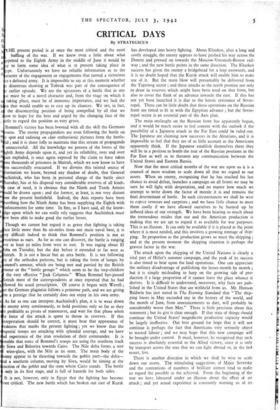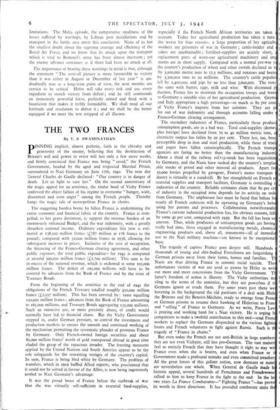CRITICAL DAYS
By STRATEGICUS
HE present period is at once the most critical and the most baffling of the war. If we knew even a little about what ppened to the Eighth Army in the middle of June it would be sy to form some idea of what is at present taking place in ypt. Unfortunately we have no reliable information as to the ' aracter of the engagement or engagements that turned a victorious to a defeated army. It is impossible to say at this moment whether
e disastrous showing at Tobruk was part of the consequence of e earlier episode. We are the spectators of a battle that in any se must be of a novel character and, from the stage on which it taking place, must be of immensc importance, and we lack the h ta that would enable us to cast up its chances. We are, in fact, a the disconcerting position of being compelled by all that we i ow to hope for the best and urged by the changing face of the tile to regard the position as very grave.
Rommel's victory has been boosted with all the skill the Germans ssess. The enemy propagandists are even following the battle on e spot and radioing en clair enthusiastic pictures from the battle- ld ; and it is sheer folly to maintain that this stream of propaganda unsuccessful. All the knowledge we possess of the losses of the ghth Army depends upon it, and yet its reliability, over and over am exploded, is once again exposed by the claim to have taken me thousands of prisoners in Matruh, which we now know to have en successfully evacuated. If we dismiss this tainted source of ormation we know, beyond any shadow of doubt, that General a chinlecic, who has been in personal charge of the battle since ursday, has at his disposal very considerable reserves of all kinds. case of need, it is obvious that the Ninth and Tenth Armies aid be drawn upon ; and the former, at least, is not very distant • the present battlefield. Indeed, the Axis reports have been scribing how the Ninth Army has been supplying the Eighth with mforcements for some time. In fine, as I have, said, all the know- ge upon which we can really rely suggests that Auchinleck must ve been able to make good the earlier losses.
Though we cannot but regard it as grave that fighting is taking ace little more than 8o air-miles from our main naval base, it is ry difficult indeed to think that Rommel's position is not as ecarious as ours. As far as one can discover, the battle is ranging er at least 50 miles from west to east. It was raging about El aba on Tuesday, but the day before it extended as far west as atruh. It is not a linear but an area battle. It is not following y of the orthodox patterns, but is taking the form of lunges by mmel's armour, which are being met and parried by the British our or the 'battle groups" which seem to be the step-children the very effective "Jock Columns." When Rommel bye-passed atruh most of the correspondents at once reported that he had llowed his usual prescription. Of course it began with Wavell ; t the German plagiarist follows a primrose path, and we are giving • a prestige that he certainly does not enjoy in his own army.
As far as one can interpret Auchinleck's plan, it is to wear down e enemy army continuously, to hold positions only so far as they e profitable as pivots of manoeuvre, and wait for that phase when e force of the attack is spent to throw in reserves. If this terpretation should be correct, it must bear that appearance of eakness that marks the present fighting ; yet we know that the penal troops are attacking with splendid courage, and we have
d experience of the iron resolution of their commander. It is ssible that some of Rommel's troops are using the southern track Siwa and Bahariya towards Cairo. The Nile delta forms a sort wine-glass, with the Nile as its stem. The main body of the emy appear to be thrusting towards the goblet part—the delta—
d a southern column, moving by Siwa, would be aiming at the ction of the goblet and the stem where Cairo stands. The battle only in its first stage, and is full of hazards for both sides.
It is not, however, only in Egypt that the fighting has become ore critical. The new battle which has broken out east of Kursk has developed into heavy fighting. About Kharkov, after a long and costly struggle, the enemy appears to have pushed his way across the Donetz and pressed on towards the Moscow-Voronezh-Rostov rail- way ; and the new battle points in the same direction. The Kharkov success has given the enemy a bridgehead for a leap eastwards, and it is no doubt hoped that the Kursk attack will enable him to make use of it. But the main blow will presumably be delivered from the Tagenrog sector ; and these attacks to the north promise not only to draw in reserves which might have been used on that front, but also to cover the flank of an advance towards the east. If this has not yet been launched it is due to the heroic resistance of Sevas- topol. There can be little doubt that these operations on the Russian front are timed to fit in with the Egyptian advance ; but the Sevas- topol sector is an essential part of the Axis plan.
The main onslaught on the Russian front has apparently begun, and it would be much easier to feel content with the outlook if the possibility of a Japanese attack in the Far East could be ruled out. The Japanese are claiming new successes in the Aleutians, and it is impossible to feel that they are of as little account as the Americans apparently think. If the Japanese establish themselves there they will be in a position to bomb the rear of the Russian positions in the Far East as well as to threaten any communication between the United States and Eastern Russia.
Now that the most critical months of the war are upon us it is a counsel of mere wisdom to scale down all that we regard as our assets. When an enemy, recognising that he has reached his last chance to avoid defeat, launches a campaign on all fronts we may be sure he will fight with desperation, and no matter how much we attempt to write down the factor of morale it is and remains the final determinant of battle. In such circumstances we shall be wise to expect reverses and surprises ; and we have little chance to meet them coolly if we have allowed ourselves to be buoyed up by inflated ideas of our strength. We have been hearing so much about the tremendous strides that our and the American production is making that we are apt to regard it as available for war purposes. This is an illusion. It can only be available if it is placed at the point where it is most needed, and this involves a growing tonnagc of ship- ping. In proportion as the production grows so must the shipping ; and at the present moment the shipping situation is perhaps the gravest factor in the war.
The attack upon the shipping of the United Nations is clearly a vital part of Hitler's summer campaign, and the peak of its success is also timed to bear upon the land operations. One can appreciate the military disadvantage of publishing the losses month by month ; but it is simply misleading to harp on the growing tide of pro- duction if a large proportion of it cannot leave the place whence it derives. It is difficult to understand, moreover, why facts are pub- lished in the United States that are withheld from us. Mr. Hanson Baldwin has just stated in The Evening Standard that "The ship- ping losses in May exceeded any in the history of the world, and the month of June, from announcements to date, will probably be considerably worse than May." There is little precision about this statement ; but its gist is clear enough. If that state of things fatould continue the United States' magnificent productive capacity would be largely ineffective. Our best ground for hope that it will not continue is perhaps the fact that Americans very seriously object to wasted labour ; and we may hope that this new campaign will be brought under control. It mutt, however, be recognised that such success is absolutely essential to the Allied victory, since it is only by transport across the seas that we can fight abroad or, in the last resort, live.
There is another direction in which we shall be wise to scale down our assets. The stimulating suggestions of Major Seversky and the contentions of numbers of brilliant airmen tend to make us regard the possible as the achieved. From the beginning of the war we have laboured under an illusion about the effect of air attack ; and yet actual experience is constantly warning us of its limitations. The Malta episode, the comparative smallness of the losses suffered by warships, by Libyan port installations and by transport in the battle area attest this conclusion. None of us has the smallest doubt about the supreme courage and efficiency of the Royal Air Force, and we know that its attack upon the transport which is vital to Rommel's army has been almost incessant ; yet the enemy advance continues as if there had been no attack at all.
The importance of bearing these warnings in mind is that, although the statement "The over-all picture is more favourable to victory than it was either in August or December of last year" is un- doubtedly true as a long-term point of view, the next months are certain to be critical Hitler will take every risk and use every expedient to snatch victory from defeat ; and he still commands an immensely powerful force, perfectly armed and fired with a fanaticism that makes it trebly formidable. We shall need all our fortitude and resolution to defeat it ; and we shall be the better equipped if we meet the test stripped of all illusion.



























 Previous page
Previous page